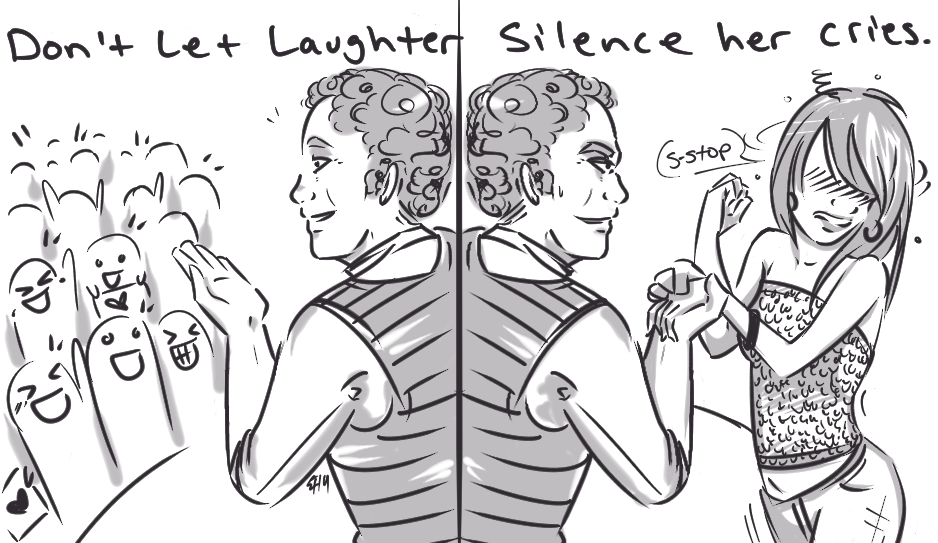Comedian Hannibal Buress made several jokes about Bill Cosby during a set in Philadelphia Thursday night, calling the elder comedian a rapist.
Buress said most people who hear his set about Cosby don’t believe it. According to Gawker, 13 women have come forward, alleging that Cosby sexually assaulted or raped them. In their summaries, many mention the use of drugs as his primary tool for coercion. Cosby was never charged with anything.
It’s startling how these allegations are unknown to the general public, especially considering Cosby’s status. Or, perhaps, his status is exactly what keeps these allegations under the rug.
As many people know, Cosby starred in the 1980s sitcom, The Cosby Show, which revolutionized both the sitcom industry and how the United States viewed the black family unit. Given its success and subsequent branding of the Cosby name, it makes sense that people would want to ignore evidence that such an otherwise respectable comedian (one who takes pride in never cussing on stage) would be capable of such heinous crimes.
The same could be said for other game-changing performers accused of or charged with sexual assault, abuse, or rape.
John Lennon, one of the most representative figures of the peace movement, abused both his first wife, Cynthia, and his second wife, Yoko Ono, on multiple occasions.
Dylan Farrow, the adopted daughter of Woody Allen and Mia Farrow, has claimed that her father, arguably the most influential comedian of modern time, sexually abused her for most of her young life. She published an open letter recounting her experiences in The New York Times in February. Still, Allen remains widely respected with no end to his career in sight.
Bill Murray, Sean Penn, Ozzy Osbourne, Christian Slater, Tommy Lee and a whole host of other people have been accused of some sort of gender- or sex-related violence. All of these people still have successful and flourishing careers in entertainment and remain big household names.
It seems a little dubious that many are still willing to support these people, especially compared to the general public’s response to such recent events in the sports world. People have called for the termination of Ray Rice’s career, yet no one calls for the end of any of these other performers’ careers.
Granted, having the monolith that is the NFL makes it much easier to terminate certain players from the game than it would to stop actors and musicians from creating art on their own time. The point is: there is little public outcry about these crimes when it’s our beloved, non-athletic performers committing them.
Why this discrepancy? One glaringly obvious factor is that of race. Athletes who get into trouble, such as Michael Vick, Adrian Peterson and Ray Rice, are black more often than not. Their crimes are seen as evidence of black brutality, perpetuating the stereotype of the angry black man.
On the other hand, most of the other performers who escape public ridicule for their sexual aggressions are white. Though it may be unlikely that the general populace is more forgiving of white people who commit these crimes, it is likely that the public is (consciously or unconsciously) harsher on black perpetrators.
It is important to keep in mind that the dominant culture—or at least the dominant voice in our culture, and thereby the dominant voice of the general populace—is one of whiteness. I cannot speak for the black perspective on these issues, and I will not attempt to do so.
Of course, Bill Cosby stands as an exception. And it’s easy to see why. His show lasted for nearly a decade because it catered so well to white audiences. Though about black people, The Cosby Show rarely, if ever, made white people feel bad about racism in the United States.
Mike Budd and Clay Steinman go so far as to say The Cosby Show perpetuated the idea that racism in the U.S. was over in their Jump Cut article, “White racism and ‘The Cosby Show.’” For the show to be successful, Cosby had to appeal to whiteness, allowing white people to form the same connection with his onscreen family as they would with, for example, Woody Allen’s characters.
As Buress points out, Cosby talks down to black people, essentially separating himself from today’s black entertainment culture. It would be wrongfully dichotomous to say that because there is a disconnect between Cosby and other black people there is a connection between Cosby and white people, but the said disconnect certainly does strengthen the existing appeal to whiteness.
It seems when white people are able to identify with people in the media, it makes it that much harder for them to accept that those people are sexual assailants. Considering that comedians often face numerous allegations compared to the very few that athletes face, it seems that our reluctance to criticize them enables more frequent offenses.
There must be no sympathy for abusers or rapists—this includes comedians and musicians. Until we can be as harsh on non-athletic entertainers as we are on athletes, those entertainers will be able to get away with sexual assault frequently and easily.








